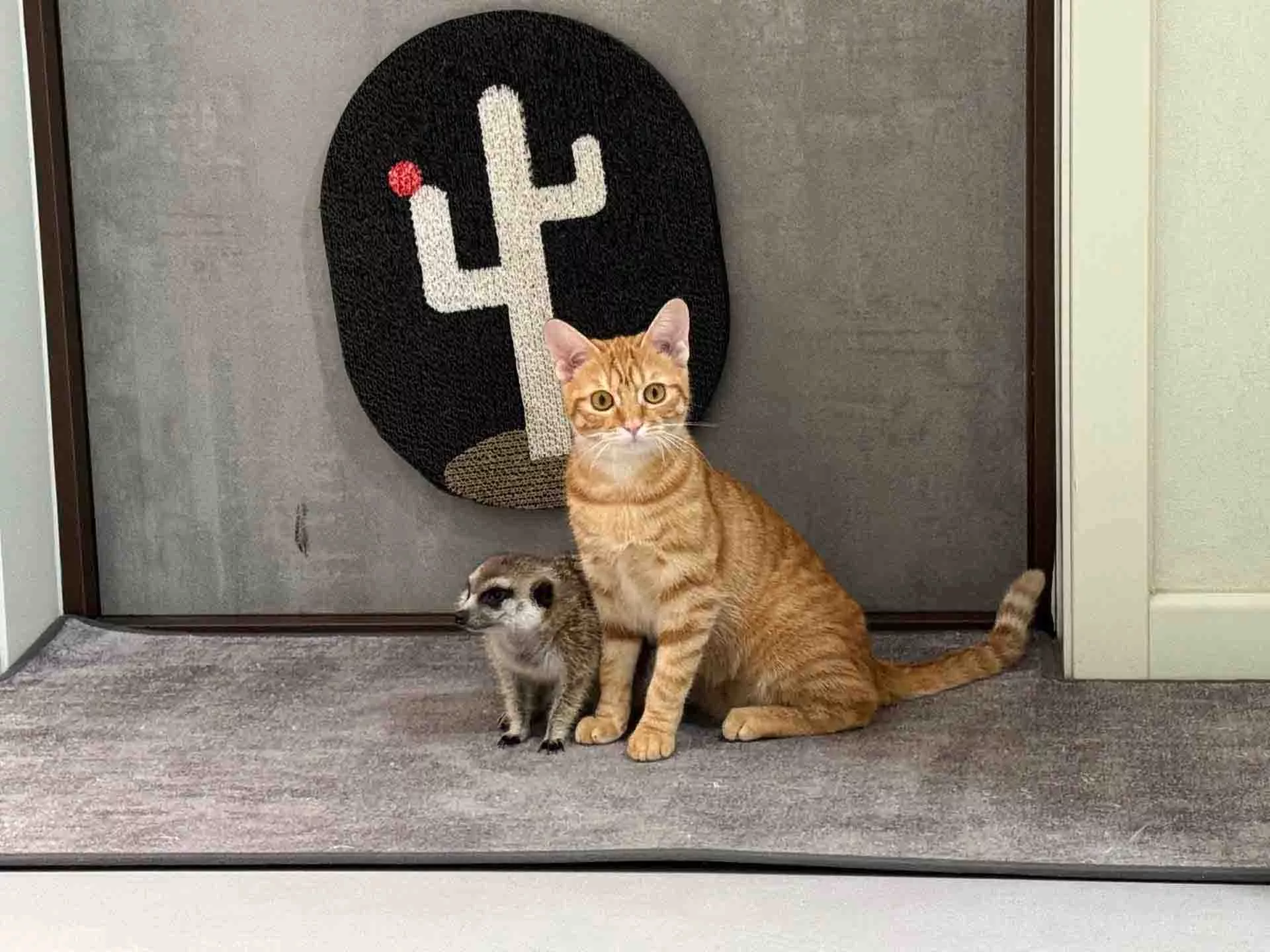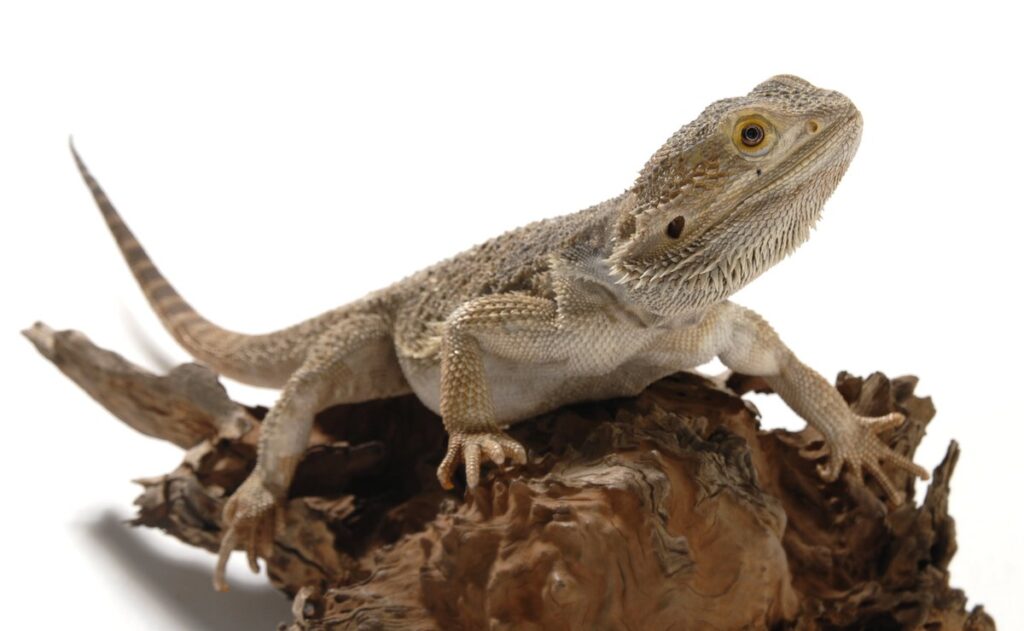
Posts page
What You Need to Know Before Adopting a Meerkat

Contents
Meerkats (Suricata suricatta) are charming, social creatures from the mongoose family, native to southern Africa’s Kalahari Desert. Their upright stance and lively personality make them a popular choice for peculiar pet lovers. But is a meerkat the right pet for you? Let’s explore the pros, cons, and what it takes to care for one.
Before diving deeper into how to care for meerkats, let’s first take a look at their basic characteristics to help you build a clear understanding.
Basic Characteristics
• Scientific Name: Suricata suricatta
• Body Length: Approximately 30 cm
• Tail Length: Approximately 20 cm
• Weight: 700–750 grams
• Lifespan: Up to 13 years in captivity
• Diet: Insects, scorpions, snakes, lizards, bird eggs, and some plant matter
• Social Structure: Live in groups of 20–60 in the wild
• Activity Cycle: Diurnal (active during the day)

After understanding the basic body structure and living habits of meerkats, we will next explore their unique personality traits, which are crucial for determining whether they are suitable for keeping as pets at home.
Meerkat Personality Traits from a Pet Owner’s Perspective
• Strong Social Needs
Meerkats are highly social animals. Keeping a single meerkat alone can lead to loneliness and anxiety, so it’s recommended to keep at least a pair.
• Dominant Females Can Be Aggressive
Especially the alpha females, who may show aggression towards other meerkats or pets. It’s important to monitor group dynamics closely.
• Males Are Generally More Docile
Male meerkats tend to have gentler temperaments, making them more suitable for first-time owners.
• Curious and Energetic
They love to explore and play, so providing plenty of environmental enrichment and toys is essential to prevent boredom and destructive behaviors.
• Sensitive to Environmental Changes
Moving, strangers, or new pets can cause stress and aggression. Maintaining a stable environment is crucial.
• Retain Wild Instincts
Meerkats like to dig, bark, and defend their territory. Owners need patience and enough space to accommodate these behaviors.
• Prone to Parasites and Illnesses
Regular veterinary check-ups are essential, as meerkats are known to carry fleas, intestinal parasites, and other health risks.
They may also carry the rabies virus, especially if sourced from the wild or unregulated breeders.
If bitten or scratched, seek medical attention immediately to rule out infection or rabies exposure.
Next, let’s look at several major advantages of keeping meerkats to help you gain a more comprehensive understanding of their lovable qualities.
Advantages of Keeping a Meerkat as a Pet
• Cute and Peculiar Appearance
Meerkats are visually striking with orange-brown fur, dark stripes, and their signature upright pose.
• Excellent Pest Control
Known for hunting rodents, snakes, and insects—some owners even use them as natural pest control.
• Low Odor
Their scent glands are not offensive to humans. Most smells come from the body or litter box.
• Trainable and Adaptable
With consistent training, meerkats can use a litter box within a few months.
• Can Coexist with Other Pets
A single meerkat in a peaceful pet environment often gets along with other animals.

• Low Destructiveness
Less likely to damage furniture compared to cats or dogs (though may steal small items like insoles!).
• Human-Like Schedule
Diurnal habits make them easier to live with—they sleep at night just like you do.
Of course, every pet has two sides. Besides the advantages, keeping meerkats also comes with many challenges and risks. Here are the disadvantages you must be aware of.
Disadvantages of Keeping a Meerkat as a Pet
• Highly Social Animals
Meerkats thrive in groups. A lone meerkat may become lonely or depressed—consider keeping at least two.
• Natural Diggers
They love digging. While not likely to damage your floors, your garden or houseplants may suffer.
• High Cost
One meerkat can cost around £1,000 (approx. $1,600 USD).
• Temperature Sensitivity
They require warm environments—especially in winter, heating systems are often needed.
• Limited Veterinary Support
Peculiar pet vets are rare. Even in big cities, finding someone with meerkat experience can be difficult.
• Can Be Noisy
New environments or strangers may trigger vocalizations as they adapt.
In the face of these challenges, scientific care and proper breeding methods become especially important. Next, we will introduce the techniques for caring for and breeding meerkats.
Care and Breeding Tips
• Housing for Meerkats
Meerkats are extremely social animals and should always be housed in groups to avoid stress and behavioral issues. Their enclosure should be as spacious as possible, with diggable substrate to support natural burrowing behavior. Multiple hiding spots and tunnels should be included to reduce anxiety and provide shelter. Enrichment is key—stimulate their curiosity by hiding food in pinecones, toilet rolls, or treat balls; bury insects in sandbox areas; and introduce cardboard mazes or unfamiliar objects to explore. Ideally, the enclosure should have both indoor and outdoor areas, with indoor temperatures maintained above 20°C to reflect their native habitat. Regular cleaning with pet-safe disinfectants is essential for hygiene.
• Feeding and Daily Care
A meerkat’s diet should mimic their natural feeding habits as closely as possible. Insects should make up the majority of their intake. Avoid harmful foods such as seafood, fatty meats, milk, and potatoes. For a more complete overview, refer to ourMeerkat Food Guide,In captivity, offer a balanced insectivore formula or low-fat cat food in moderation, taking care to prevent overfeeding and obesity. Provide a variety of gut-loaded live insects such as mealworms and crickets, and dust them with calcium to ensure proper bone health. Clean, fresh water must be available at all times in a shallow dish and replaced daily.
• Important Handling & Safety Tips
Avoid adopting meerkats that have spent their early life in the wild, as they are much harder to tame and may remain fearful or aggressive. When taking meerkats outdoors, always use a secure leash and harness to prevent accidents, escapes, or poisoning from unknown sources.
After mastering the basic care and breeding knowledge of meerkats, we will next delve into how socialization and behavior training can help meerkats better adapt to family life.
Training Meerkats: Socialization vs. Behavior Conditioning
Because meerkats are social and easily tamed, they are often used for scientific studies regarding binocular vision.
(Source: Morán et al., 1983; van Staaden, 1994, via Animal Diversity Web)
Socialization Training for Meerkats
Meerkats are social animals that naturally live in groups in the wild. Socialization training helps them adapt to human environments and build healthy relationships with people and other animals. Below are several key methods for socializing meerkats:
• Early Socialization
Early socialization is especially important for young meerkats. Keeping them with other meerkats allows them to learn social skills and behavioral norms. In addition, regular contact with humans helps build trust and adaptability.
• Gentle Interaction
Establishing gentle and progressive contact is a core part of socialization training. Initially, observe from a distance to let the meerkat get comfortable with your presence. Gradually increase the time and manner of interaction, making sure not to cause fear or stress.
• Positive Reinforcement
Use positive reinforcement, such as treats or praise, to encourage adaptive behaviors. For instance, when a meerkat interacts positively or calmly with humans, reward it with favorite food or toys to reinforce that behavior.
• Gradual Introduction to Other Animals and People
Slowly introduce meerkats to new animals and humans. Start by letting them observe interactions at a distance, then gradually allow contact. Ensure these experiences are positive and low-stress to avoid triggering fear or aggression.
• Environmental Enrichment
Provide varied and stimulating environments with toys, obstacles, and activities to encourage exploration and adaptability. This helps keep meerkats active, happy, and socially responsive.
⚠️ Note: Socializing meerkats requires professional knowledge and experience. Ideally, socialization should begin with hand-rearing during infancy to build trust and a stable temperament. It’s best to work with an experienced animal trainer or meerkat expert to ensure a safe and effective process.
Behavioral Training
Meerkat Training Using Bell and Positive Reinforcement
Using a bell and positive reinforcement is an effective method to train meerkats to perform specific behaviors. Trainers place food in a designated spot (such as inside a box) and ring a bell when the meerkat enters and begins to eat. This gradually builds an association between:
“Entering the box → Receiving food → Hearing the bell.”
This method is a form of operant conditioning through positive reinforcement. It helps shape consistent behavioral responses and encourages meerkats to follow human cues. Such training is especially useful for facilitating routine care, enclosure transfers, or medical check-ups.
The key to success is consistency, patience, and timely rewards.
(Source: Reddit Zookeeping Discussion)
After learning how to train meerkats, taking a step back to look at their lives in the wild can help us better understand their natural instincts and behavioral needs — allowing for a more rational decision on whether or not to keep one as a pet.
What Are Meerkats Really Like in the Wild?
Before you make any decisions about adopting a meerkat, it’s worth understanding how they live in the wild.
According to BBC Earth, meerkats are native to the arid regions of southern Africa. They live in social groups of 10 to 30 individuals, cooperate closely, and even take turns standing guard to protect the group from predators. During the day, they forage for insects, reptiles, and fruit. At night, they retreat to complex underground burrows they’ve dug themselves.
While they may look adorable and intelligent, the Royal Society for the Prevention of Cruelty to Animals (RSPCA) and other animal welfare organizations strongly advise against keeping meerkats as pets. Most home environments simply can’t provide the space, social interaction, and natural behaviors meerkats need. As a result, pet meerkats often suffer from stress, aggression, or health issues.
❗ If you’re seriously considering a meerkat, be sure to understand their natural instincts and needs — not just their cute appearance.
Final Thoughts
In conclusion, meerkats are incredibly charming, intelligent, and full of personality—but they’re not for everyone. Raising them well takes patience, time, money, and a solid understanding of their needs. If you’re ready for the commitment, they can become unique, fascinating, and rewarding companions in your life.
We hope this guide helps you make an informed decision. If you found it helpful, feel free to share it with friends who are also curious about keeping a meerkat!
References
- https://animaldiversity.org/accounts/Suricata_suricatta/
- https://animaldiversity.org/accounts/Suricata_suricatta
- /https://www.reddit.com/r/Zookeeping/comments/1ljtn7f/meerkat_training_help/
- https://www.rspca.org.uk/adviceandwelfare/pets/other/meerkats
- https://animals.howstuffworks.com/mammals/meerkats3.htm
- https://www.rvc.ac.uk/Media/Default/Beaumont%20Sainsbury%20Animal%20Hos
- https://www.rvc.ac.uk/Media/Default/Beaumont%20Sainsbury%20Animal%20Hospital/documents/Caring-for-your-meerkat%20Oct%202019.pdfpital/documents/Caring-for-your-meerkat%20Oct%202019.pdf
















